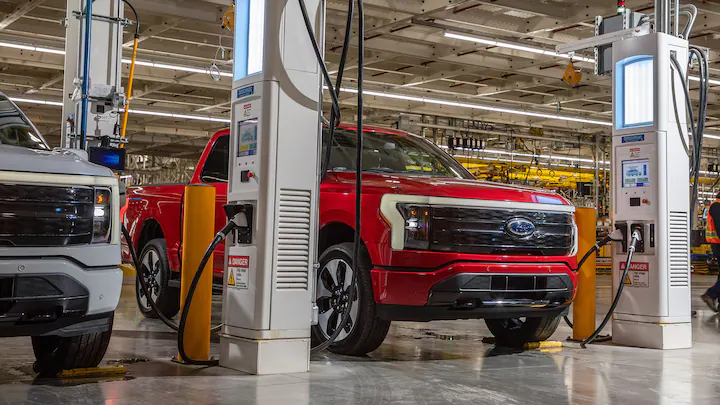
Ford CEO: Cybertruck is for Silicon Valley, Our Trucks for Working People

Photo: F-150 Lightning
In a recent sit-down with CNBC’s Jim Cramer, Ford CEO Jim Farley shared insights into the company’s future, its electric vehicle (EV) strategy, and its partnership with Tesla. The interview took place at Ford’s headquarters in Dearborn, Michigan.
Farley revealed that Ford’s decision to partner with Tesla was driven by the reliability and extensive reach of Tesla’s charging network. As per the agreement, Ford EV drivers will gain access to over 12,000 Tesla Superchargers across the U.S. and Canada in 2024.
Farley stated, “I have no problem being opportunistic when it comes to advantaging my customers. Our team didn’t really hesitate because it’s good for customers.” He believes that the additional charging stations will greatly benefit Ford drivers, despite the company’s already extensive charging network.
During the partnership negotiations, Farley found Tesla CEO Elon Musk respectful, attributing it more to the legacy of Henry Ford than to his own influence. Farley also expressed confidence that Musk’s Cybertruck won’t lure away Ford’s customers.
“The reality is, America loves an underdog — and we are the market leader for EV trucks and vans, and we know those customers better than anyone,” Farley said. He added, “And if he wants to design a Cybertruck for Silicon Valley people, fine. But I don’t make trucks like that. I make trucks for real people who do real work, and that’s a different kind of truck.”
Ford has divided its operations into three main sectors: Ford Blue for conventional vehicles, Ford Model e for EVs, and Ford Pro for commercial vehicles. Farley noted that Ford is a global leader in commercial vehicles, with 90% of its Pro business coming from small or medium-sized contractors like plumbers, electricians, and emergency responders.
Despite a dip in EV revenue this quarter, Farley anticipates a positive margin of 8% by the end of 2026. Ford’s latest earnings report exceeded consensus estimates, with revenue reaching $41.5 billion.
Farley also emphasized Ford’s commitment to maintaining the majority of its production in North America, even in the face of potential tough negotiations with the United Auto Workers union. He stated, “We believe in American-made BlueOval city in Tennessee or Kentucky-built pickup truck, EV pickup truck; people will pay for that American technology.”
